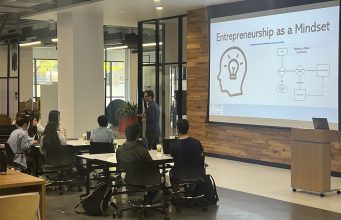
“The healthcare marketplace is not really equipped to change. The more innovative and disruptive your product is, the more you’re most likely displacing something that a lot of capital has already gone into.”
This insight, from Jim Millar, founder and principal of the Vine Group and principal of CVG Advisors, was shared with investors, entrepreneurs and members of the Goizueta community at the Miller-Ward Alumni house on September 19. He pointed out that while logic dictates that if a product works and save lives it will be well-funded, “that’s not reality.” He advised entrepreneurs to go into capital raising with a good understanding of what their product may be displacing.
Millar was one of the leading inventors, investors and entrepreneurs in the healthcare industry discussing innovation in healthcare on the RAISE (Retention and Advanced Investment for the Southeast at Emory) Forum “Rise” Panel, a popular panel event that provides interested members of the public an opportunity to network and hear from industry experts ahead of the biannual, invitation-only RAISE Forum, which brings together early-stage companies based in the Southeast with potential investors and mentors.
Millar was joined by Dr. Scott Boden, chairman of the orthopedics department at Emory School of Medicine and vice president of business innovation at Emory Healthcare; Dr. Angela Fusaro 01C 17WEMBA, co-founder and CEO of Physician 360; and Dr. Arik Hanannel, CEO and co-founder of FUSMobile. Steve Brett, executive coach and founder of Presentation TuneUps, moderated the panel.
The panelists discussed the challenges that make change and innovation—difficult endeavors in any industry—even harder within the healthcare landscape.
Navigating the necessary regulations is often one of the first hurdles entrepreneurs face after demonstrating the efficacy of a new product or technology. But it’s far from the last.
Like any innovation, a new healthcare product must also make economic sense to have any chance of success. In the healthcare industry, there is an additional consideration: will insurance companies cover its use? “And still, this is not even the highest step,” said Hanannel, “because even after you get regulator approval and get coverage, the next, bigger step, is medical acceptance.”
Physicians, nurses, or other healthcare workers must be willing to embrace the change an innovation necessitates. “Sometimes the thought leaders aren’t the end users,” Boden pointed out. And end users like physicians may not be interested in trying something new.
“They’re trying to get through their day, which is packed and packed with more volume, and they’re trying to improve quality, and the last thing they’re trying to do is new and different and changing routines,” Boden said.
So far, Fusaro and Hanannel have been able to find success despite the harsh environment for entrepreneurs.
Physician360 faced potential pushback from primary care physicians: Fusaro’s telemedicine platform offers simple diagnostic services that often eliminate the need for a trip to the doctor’s office. “The challenge there, the opportunity there, is how you frame that,” Fusaro said. In her conversations with primary care physicians, Fusaro emphasized how her service steps in when physicians can’t: after hours, on weekends, at short notice. “Part of the challenge is getting that level of understanding,” Fusaro said. “There’s a lot of ongoing conversation about that.”
Hanannel’s focused ultrasound technology can serve as an alternative to surgery or radiotherapy, potentially transforming the treatment of many medical disorders. Hanannel feels confident FUSMobile hits the right balance. “We’re at a cheaper, faster, better version,” he said. “It’s a disruptive value in a non-disruptive envelope.”
At the conclusion of the discussion, the panelists shared their visions of healthcare innovation over the next decade. In the coming years, the panelists hope to see a cure for cancer, elimination of stigma from mental health treatment and advancements in the human-machine interface and data analytics.
The event was hosted by Charles Goetz, distinguished lecturer in entrepreneurship and senior lecturer in organization and management at Goizueta; Amelia Pane Schaffner, director of entrepreneurship at Goizueta and RAISE Forum co-founder Barry Etra.
The next RAISE Forum is November 15, 2019 at Goizueta Business School. For more information visit http://www.raiseforum.com/candidate-application









